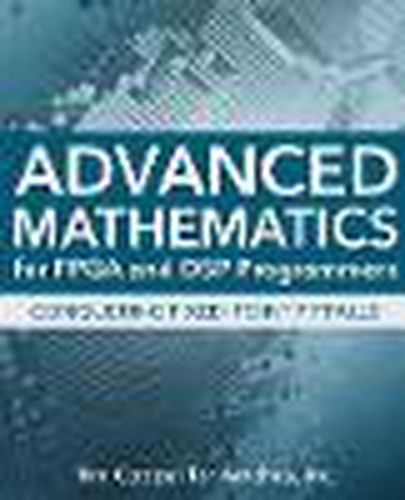Readings Newsletter
Become a Readings Member to make your shopping experience even easier.
Sign in or sign up for free!
You’re not far away from qualifying for FREE standard shipping within Australia
You’ve qualified for FREE standard shipping within Australia
The cart is loading…






Advanced Mathematics for FPGA and DSP Programmers covers the mathematical concepts involved in FPGA and DSP programing that can make or break a project. Coverage includes Numbers and Representation, Signals and Noise, Complex Arithmetic, Statistics, Correlation and Convolution, Frequencies, The FFT, Filters, Decimating and Interpolating, Practical Applications, Dot Product Applications, and a glossary of DSP arithmetical terms. About the Author Tim Cooper has been developing real-time embedded and signal processing software for commercial and military applications for over 30 years. Mr. Cooper has authored numerous device drivers, board support packages, and signal processing applications for real-time-operating systems. Mr. Cooper has also authored high-performance signal processing libraries based on SIMD architectures. Other signal processing experience includes MATLAB algorithm development and verification, and working with FPGA engineers to implement and validate signal processing algorithms in VHDL. Much of Mr. Cooper’s experience involves software development for systems having hard real-time requirements and deeply embedded processors, where software reliability, performance, and latency are significant cost drivers. Such systems typically require innovative embedded instrumentation that collects performance data without competing for processing resources. Mr. Cooper holds a Bachelor of Science in Computer Sciences and a Master’s degree in Computer and Electronics Engineering from George Mason University.
$9.00 standard shipping within Australia
FREE standard shipping within Australia for orders over $100.00
Express & International shipping calculated at checkout
Advanced Mathematics for FPGA and DSP Programmers covers the mathematical concepts involved in FPGA and DSP programing that can make or break a project. Coverage includes Numbers and Representation, Signals and Noise, Complex Arithmetic, Statistics, Correlation and Convolution, Frequencies, The FFT, Filters, Decimating and Interpolating, Practical Applications, Dot Product Applications, and a glossary of DSP arithmetical terms. About the Author Tim Cooper has been developing real-time embedded and signal processing software for commercial and military applications for over 30 years. Mr. Cooper has authored numerous device drivers, board support packages, and signal processing applications for real-time-operating systems. Mr. Cooper has also authored high-performance signal processing libraries based on SIMD architectures. Other signal processing experience includes MATLAB algorithm development and verification, and working with FPGA engineers to implement and validate signal processing algorithms in VHDL. Much of Mr. Cooper’s experience involves software development for systems having hard real-time requirements and deeply embedded processors, where software reliability, performance, and latency are significant cost drivers. Such systems typically require innovative embedded instrumentation that collects performance data without competing for processing resources. Mr. Cooper holds a Bachelor of Science in Computer Sciences and a Master’s degree in Computer and Electronics Engineering from George Mason University.